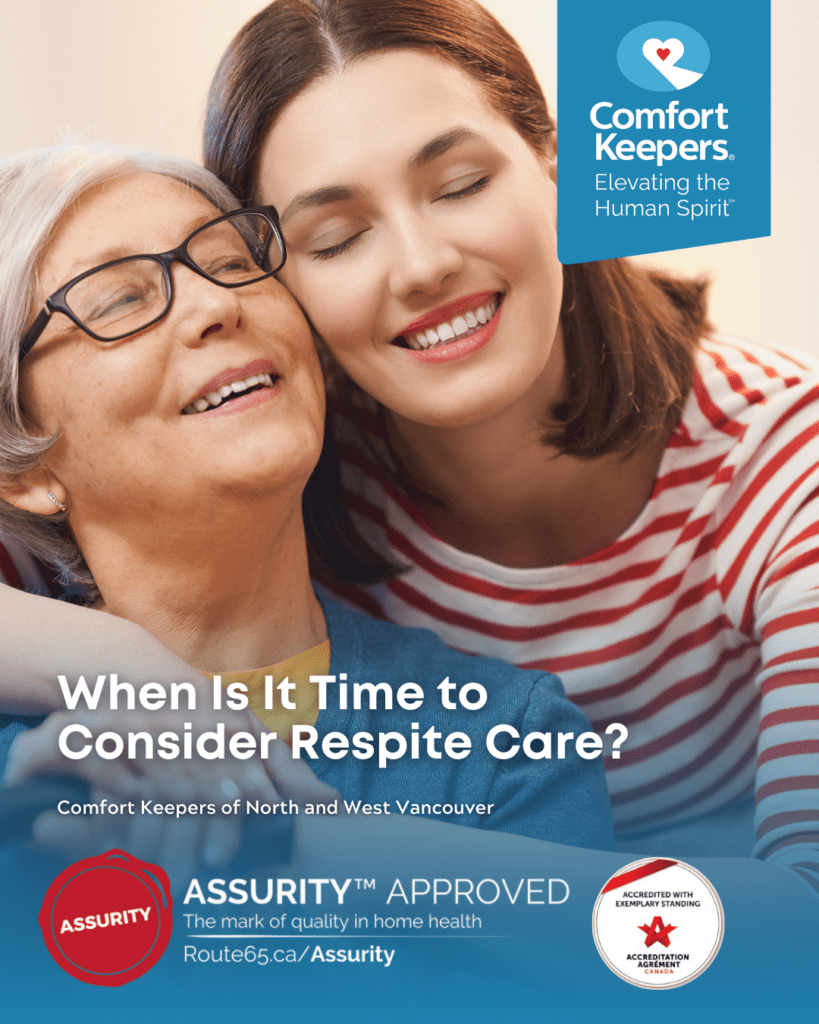When Is It Time to Consider Respite Care?
Respite Care | June 11, 2024

What Every Family in North and West Vancouver Needs to Know About Respite Care for Their Loved One
When is it time to consider respite care? | Respite care is not self-indulgent. It’s a necessity. Caring for an older or ill family member can be hugely rewarding and bring you closer – but being consumed by it will drain you physically and emotionally, and eventually cause burnout.
Does Your Aging Loved One Require Respite Care?
That’s why caregivers need to seek occasional respite from their responsibilities, whether for a few hours a week to run personal errands – or longer to take a much-needed vacation. Respite care offers a chance to de-stress, restore physical and mental energy, and establish a balanced life.
Fast Fact
In a study, 60% of family caregivers, ages 19-64, reported “fair or poor” health and one or more chronic conditions or disabilities, compared with only 33%
of non-caregivers.
The Many Benefits of Respite Care
Respite care for loved ones provides short-term breaks for caregivers, ensuring the well-being of the caregiver and the client. After all, you want to be at your very best, both physically and mentally.
Five benefits to respite care:
#1 – Leisure time for renewal:
Take a walk, read a book, browse the internet, visit an art gallery or museum, listen to music – whatever brings joy and a sense of calm.
#2 – A change of venue:
Escaping the day-to-day of caregiving can help you relax, bring you a new perspective on the situation, and give you a chance to clear your head to come up with new solutions to problems or concerns.
#3 – Enjoyment and pleasure:
As a caregiver, you must remember that you have the right to enjoy life. You also have no reason to feel guilty.
#4 – A renewed sense of self:
Caregivers are individuals who need to live their lives and keep a firm grip on their own identity.
#5 – Socialization:
Don’t be isolated or feel alone. Take time to engage with friends, family, and co-workers by sharing meals, conversations, and experiences.
Related Article: In-Home Care Can Reduce Hospital Readmission
Eight Things to Do Once You’ve Secured Respite Care:
#1 – Involve your loved one:
Keep your loved one informed when planning for time off from your caregiving duties. Involve your loved ones to decide how long you will be away, and who will fill in for you when you’re gone. Express how they will benefit from your relaxed and refreshed state. Reinforce the idea that they will also benefit from socializing with other people.
#2 – Acknowledge your role:
The National Family Caregivers Association completed a survey that showed some often refuse that their caregiver role is separate from their role as a parent or spouse. The survey found that a shift in this attitude impacts work/life balance.
#3 – Assess your needs:
Decide what care is necessary in your absence. Determine what skills are needed to take care of your loved one.
#4 – Stay organized:
Use a calendar to organize and plan for assistance, and don’t forget to schedule time for yourself. Schedule some respite time and indicate how you plan to use it.
#5 – Create your own space:
Once you’ve decided on having respite relief, find a place for yourself. You shouldn’t have to leave the house to spend time relaxing or with hobbies.
#6 – Deal with your feelings:
Bottling up your emotions takes a toll on your psyche and your health. Share feelings of frustration with friends and family. Seek support from others who are in a similar situation. Talk with a professional counsellor, or join a caregiver support group.
#7 – Remember to say “no” when it’s necessary:
Accept that you can’t do everything, and resist the urge to take on more than you can handle. If someone asks you to do something you cannot do, be honest and explain why you can’t – and don’t feel bad about it.
#8 – Stay positive:
Do your best not to dwell on the negative. Hold a family meeting or call a senior care mediator to resolve conflicts with siblings and relatives. Remember to be proud of all you are doing, and focus on the rewards of caring for someone you love.
Respite care isn’t about indulgence; it’s a vital necessity. While caring for an older or ill family member can be deeply rewarding and strengthen bonds, becoming consumed by it can take a toll on your physical and emotional well-being, leading to eventual burnout.
The Best Senior Home Assistance Care in North and West Vancouver is Comfort Keepers®
Our senior home care agency offers in-home care focusing on aging in place. Our services include; dementia care, end-of-life care, post-surgery care, and palliative care. Comfort Keepers can assist seniors with living transition services, personal care, companionship care, and more!
Quality and Accredited Elderly Care: Happier, Healthier, and at Home with 24/7 Senior Care Opportunities!
Do you need a home care solution for yourself or a loved one? Have you been thinking about retirement homes and their alternatives as a solution? Comfort Keepers® enables seniors to maintain happy, healthy lives in the comfort of their own homes. In-home care services are available in North Vancouver, West Vancouver, and the surrounding areas.
Comfort Keepers® is a Senior Care Agency That Can Make a Difference with Interactive Caregiving™
Our in-home caregivers ensure our senior clients have the best quality of life. The Interactive Caregiving™ program ensures that a senior’s safety, nutrition, mental well-being, and everyday needs are met. This program brings joy and good health to each client’s home.
Comfort Keepers® North Vancouver and West Vancouver Can Help with In-Home Elderly Care Services!
If you are concerned about the health and well-being of a loved one we can help! Comfort Keepers offers 24-hour care and delivers top-quality and compassionate care for seniors. We are dedicated to safety technology solutions that foster independence and enhance well-being.
Locally Owned and Operated Home Health Care Agency
Our care centers around companionship for seniors. Empathetic care originates from the soul and allows us to meet our client’s requirements. The seasoned in-home caregivers employed by Comfort Keepers are carefully chosen based on their empathetic qualities.
Contact the Comfort Keepers® North Vancouver and West Vancouver office at (604) 998-8806 to learn more about our unique in-home care solutions for seniors.
Comfort Keepers is an Accredited Senior Care Agency in North and West Vancouver, BC
Comfort Keepers® North and West Vancouver accredited with Exemplary Standing with Accreditation Canada. Accreditation is an intensive process in which industry experts examine an organization’s processes, policies, and procedures against quality standards. To achieve accredited status, Comfort Keepers® met or exceeded the rigorous standards for Home Care companies, outlined by Accreditation Canada.
References:
AARP. Caregiving Resource Center. “What Is Respite Care? A Break for the Caregiver.” Web. 2016.
AgingCare.com. “The Importance of Respite Care”. Web. 2016.
The Commonwealth Fund. “A Look at Working-Age Caregivers’ Roles, Health Concerns, and Need for Support” by Alice Ho, Sara R. Collins, Karen Davis, and Michelle M. Doty. Whitepaper. Web. 2016.
Individualized Home Care Options
Long-Term Home Care, 24 Hour Home Care & Short Term Care Options Customized for You





